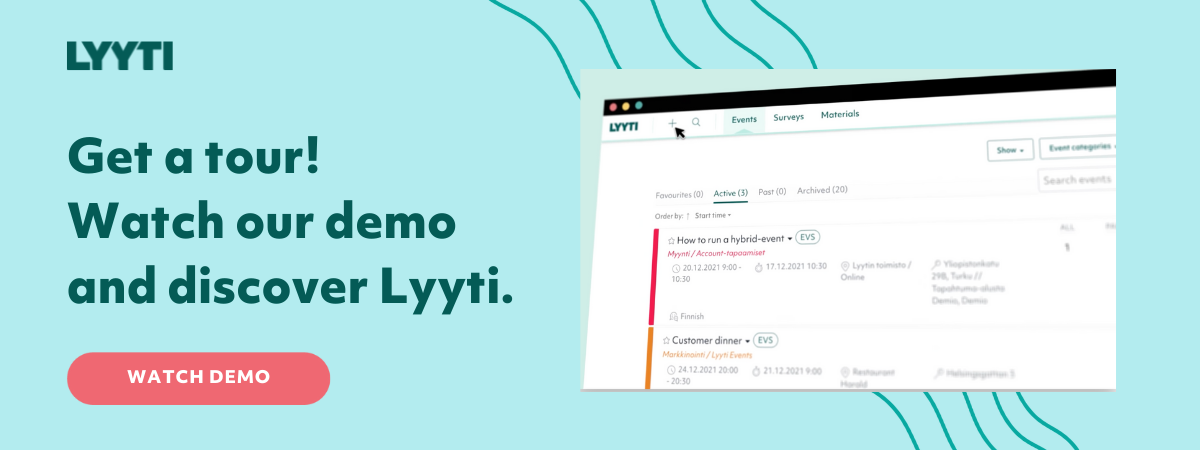Integrations – moving data from one system to another – contribute to modern business processes quite significantly. With the help of integrations, companies and organisations can centre, control and utilise the data they collect from different sources and consequently measure and upgrade their activities.
Meetings, webinars, courses and other types of events are no exception in this regard; they're simply one channel among others that collect contacts and their information. By connecting your event management software with other data management systems, such as CRM, marketing or HR tools, you can reduce manual work related to all data management. Lyyti offers ready-made integrations to the most common platforms and systems, as well as the opportunity for clients to create custom-made integrations through our REST API.
To better understand the significance of integrations between Lyyti and other software and improve and further develop these, we asked our clients about their take on the topic. How do Lyyti users benefit from integrations and what is their future role? We also discuss integrations from our developers' point of view.
Talk to me data
In late 2020, we launched a survey to find out what kind of integrations our clients use and how do the integrations contribute to their operations, especially in event management and marketing processes. More than 90% of the respondents said that integrations play an essential part in their event management, leading us to conclude that they appreciate high-quality data and want to use it in different ways.
Also, 80% think that the significance of integrations will increase, and that's why we know this is a theme for Lyyti to focus on. Our clients use various software, and we want to offer them the possibility to connect their data channels smoothly and effortlessly.
One of the biggest benefits these integrations offer is to have up-to-date data on all contacts and across systems. For example, it's important that sales teams have an overview of the different brand touch points a prospect may have. To record all event-based interactions it's useful to integrate Salesforce with Lyyti.
Integrations in the making
To dig deeper into the topic of integrations, we decided to go straight to the source: Lyyti's Product Team. We wanted to know what the integration development process looks like, what the main challenges tend to be and what possibilities we can expect in the future.
 Jenni Savolainen, Product Manager at Lyyti.
Jenni Savolainen, Product Manager at Lyyti.
What does a developer need to consider when dealing with integrations? We're talking about complex coding, after all!
"Integrations and APIs offer you a world of possibilities. As integrations vary in size and type, and they're all unique somehow, you have to consider different aspects when developing them. Lyyti's clients can use our open API to fetch data and utilise it for their own needs, e.g., for building training- and event calendars for their websites. For this to be possible, we need to provide an API that allows easy access to Lyyti's dataset so that API experts can effortlessly find the events created there," explains Jenni Savolainen, Product Manager at Lyyti.
What about ready-made integrations?
Jenni continues: "We also offer ready-made integrations, like Salesforce CRM and Hubspot, that our clients can activate with one or two clicks. When creating these integrations, we need to think, what is the problem we're trying to solve with that specific integration? When it comes to softwares, how do these particular softwares handle different data? To connect another system with Lyyti, we need to understand its core features and the user's needs. Even here, there are many aspects to consider."
What's in store for the future; which direction is Lyyti going to take integration development?
"In the long run, we'd like to make it more simple for information to run between the systems. That means our API should provide a more straightforward route to fetch data or, for example, use webhooks to send notifications from Lyyti when something changes in the participant's data. That would lessen the need to create queries about any data that might have changed. As our API provides our clients with many opportunities that we aren't always aware of ourselves, it's also hard to describe all the possible ways to utilise it. When it comes to data, the sky's the limit!"
Integration terminology explained:
- Integration: Bringing together data from different systems to be used in one place.
- REST API (Also RESTful API): Short for representational state transfer and application programming interface – an interface for drawing data from one system to another.
- Webhook: a way for an application (e.g. Lyyti) to provide other applications (e.g. Salesforce) with information.
- Query: Request for information derived from a database.
Similar articles

Lyyti joins HubSpot's Connect Program with event management integration

Maximize Event Success with Event CRM Software and Event Platform Integrations

How to Choose Event Registration Software: Features to Consider

Stop doing the Spreadsheet Shuffle! There's an integration for that.





